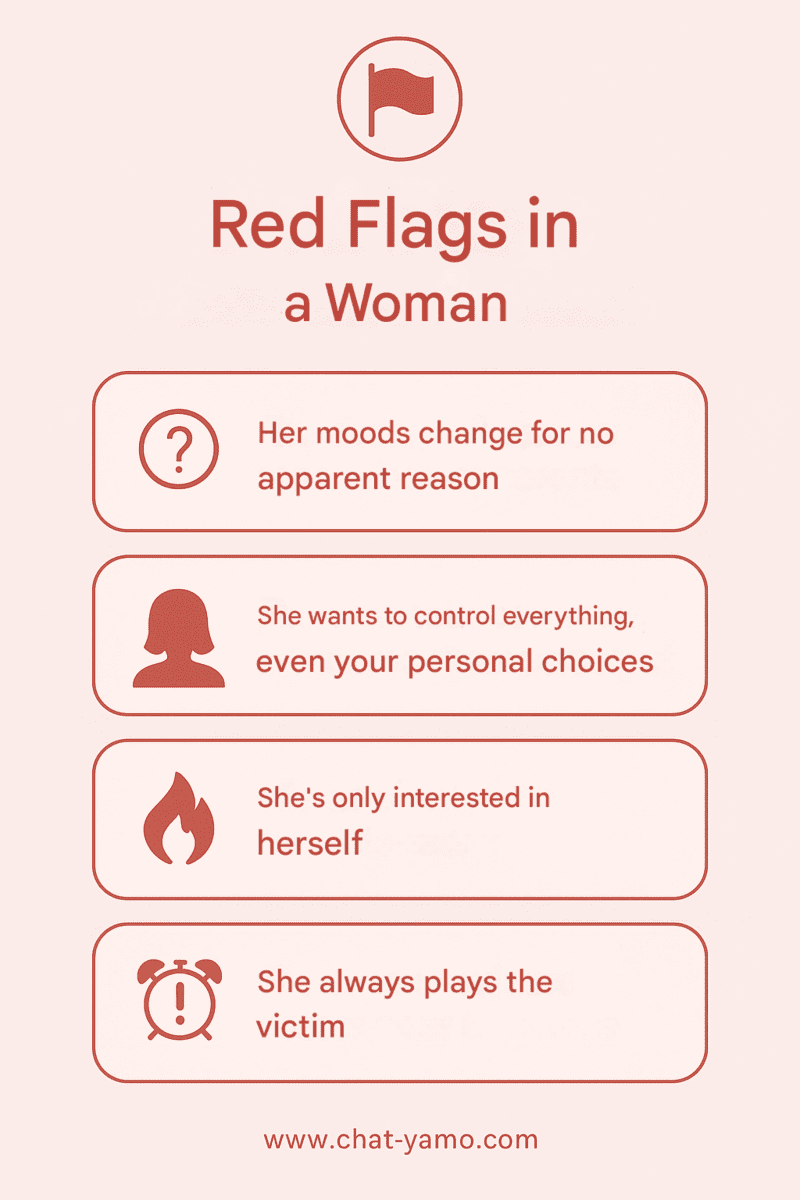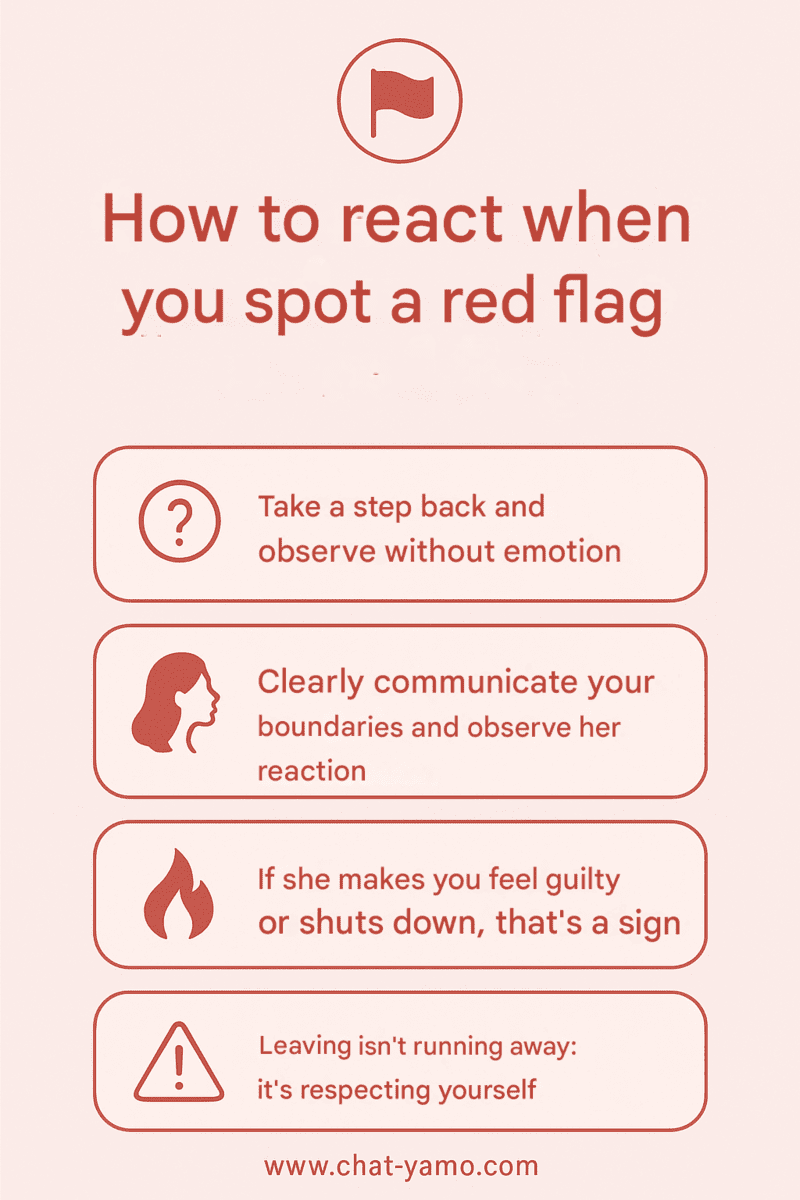She is brilliant, attractive, charming… and yet something isn’t quite right. You feel a little voice inside you whispering that something is wrong, but you push it away, convinced that love will eventually fix everything. This is where red flags come into play. A red flag is not just a character flaw or a bad day. It is repeated, disturbing, or manipulative behavior that, if ignored, can lead to an unbalanced or even toxic relationship. Yet many of us downplay them at first: “She’s just stressed,” “It’s temporary,” “I must be too sensitive…” The goal of this article? To help you distinguish real warning signs from simple human imperfections, so you can protect your emotional well-being before it’s too late.
Table of Contents
ToggleUnderstanding what a “red flag” really means
The expression “red flag” comes from the vocabulary of motor racing, where a red flag signals an immediate danger requiring the race to be stopped immediately. In the context of love, it plays the same role: a clear warning that something is wrong. But be careful, not all flaws are red flags. Being a little jealous from now and then, having mood swings after a bad day, or even being selfish sometimes… these are normal human traits. What makes the difference is the frequency, intensity, and impact of these behaviors on the relationship.
A red flag is when a person:
- isolates you from those around you,
- manipulates your emotions to get what she wants,
- refuses to take any responsibility during argumentss,
- or constantly makes you doubt yourself.
What makes these signs so difficult to spot is that they often appear in the first few weeks, but are masked by initial enthusiasm, fear of loneliness, or the hope of “saving” the other person. We tell ourselves, “Maybe if I try harder, she’ll change.” Except that red flags don’t disappear over time… they get worse. Learning to identify them doesn’t mean being suspicious or cynical. It means taking care of yourself, with clarity and kindness.
See also : Dating in your 30s, 40s, and 50s: What Really Changes?
Emotional and behavioral red flags
All relationships go through ups and downs; that’s human nature. But certain behaviors, if they become recurring, are no longer just a “stressful moment” or a “bad day.” These are worrying emotional or behavioral signals that, over time, undermine your confidence, your freedom, and your inner peace. What makes them so insidious is that they often creep in gently, sometimes even under the guise of tenderness or concern. Yet they create an unhealthy atmosphere where you feel constantly defensive, guilty, or emotionally exhausted.
Here are four common but often misunderstood red flags that deserve your full attention.

She changes her mood for no apparent reason.
One day, everything is fine: she is smiling, attentive, full of affection. The next day, without anything having changed on your part, she is cold, distant, even aggressive. You spend your time trying to figure out what you’ve “done wrong,” when you haven’t done anything at all. This emotional instability creates an atmosphere of constant tension. You walk on eggshells, afraid of triggering a disproportionate reaction. Eventually, you lose confidence in your own perceptions and your ability to “do the right thing.”
Please note: this is not about mental illness (which deserves support and assistance), but rather a toxic relationship pattern where your emotions are constantly at the mercy of her unpredictable moods.
She wants to control everything, even your personal choices.
At first, it may seem like she’s just being attentive: “Who are you going out with tonight?”, “Why are you wearing that?”, “You should stop talking to your former colleague…” But very quickly, these questions become orders disguised as concern. Behind this need for control often lies excessive jealousy, a fear of abandonment, or a desire for domination. She criticizes your friends, questions your professional decisions, or even pushes you to cut ties with your family… all “for your own good.” But true love doesn’t thrive on control. It is built on trust, respect for autonomy… and freedom of choice.
She is only interested in herself.
You talk about your days, your dreams, your sorrows… and you feel like you’re talking to a brick wall. She barely listens, quickly changes the subject, or systematically brings the conversation back to her own experiences. This lack of empathy turns the relationship into a two-way monologue. You give, support, and console, but when it’s your turn to need her, she is absent, distracted, or indifferent.
A healthy relationship is based on a two-way exchange. If you are always the one carrying the emotional weight, it’s a clear sign that you are not in a relationship, you are on duty.
She always pretends to be the victim.
No matter what the situation (an agreement, a mistake on her part, a simple discussion…), she always manages to present herself as the one who is suffering, who is misunderstood, or who is “doing everything to save the relationship.” The result? You find yourself apologizing for things you didn’t do, calming her tears, reassuring her ego… when in fact you are the one who is suffering. This victim act is a subtle form of manipulation that instills guilt where there should be dialogue. In the long run, it causes you to doubt yourself, minimize your own needs… and accept the unacceptable.
See also: Red flags in men: signs you should run away from
Red flags related to lifestyle and values
Sometimes it’s not the big dramas or violent conflicts that set off alarm bells… but a more subtle unease, a lingering feeling that you’re not moving in the same direction. Love isn’t always enough to bridge a gap in values, plans, or outlook on life. Red flags related to lifestyle don’t always scream, they whisper. They hide behind broken promises, telling silences, or life choices that, in the long run, make any lasting relationship impossible. And yet, they are just as decisive as more visible toxic behaviors.
Here are three subtle but powerful signs that should not be ignored.
She talks a lot… but rarely takes action.
She talks to you about her big plans, her dreams of change, her desire to build something solid with you. She promises to make an effort, to sort out her problems, to give you more time… but nothing ever changes. Fine words are reassuring, of course. But it’s actions that build trust. If, month after month, her commitments remain unfulfilled, it’s because her priorities are not what she claims they are. And staying in a relationship based on empty promises means settling for waiting, not living in the real world.
She never plans ahead with you.
You bring up the future, a trip, a move, even a simple discussion about “where we’ll be in two years”… and she dodges the question, changes the subject, or responds with a vague “we’ll see.” Worse, she seems uncomfortable, distant, or downright closed off to the idea of building anything together. This doesn’t necessarily mean she doesn’t love you. But if she systematically refuses to imagine herself with you in the long term, it’s a clear sign that she’s not ready, or will never be ready, to commit to a lasting relationship. And continuing to hope that she’ll change her mind means risking losing months, even years, waiting for someone who doesn’t see you in her future.
She lives in chaos or refuses to take responsibility.
Her life seems to be a series of crises: constant financial problems, unstable relationships, impulsive decisions, and self-destructive behavior (addictions, neglect, escapism). When you bring up these issues with kindness, she blames others, bad luck… or you. Living with someone who refuses to take responsibility means that both of you are carrying the weight, but only one of you is bearing the burden. Eventually, you become the pillar, the savior, the parent… but never again the partner. And a relationship cannot flourish when one of the two people involved refuses to grow up.
Why are these red flags often ignored?
You’ve seen it all. The unpredictable moods, the forgotten promises, the lack of empathy, the absence of plans for the future… And yet you stay. Not out of weakness, but because love, hope, and fear sometimes form a cocktail more powerful than reason.
It’s human nature to want to believe in change. Especially when you care about someone. But what makes red flags so difficult to leave behind isn’t so much what the other person does, it’s what we tell ourselves to justify staying.
“She’s going to change.”
This is undoubtedly the most common and misleading phrase. We convince ourselves that if we love them enough, if we are patient enough, understanding enough, they will eventually “open their eyes,” grow up, and stabilize. But change never comes from outside. It comes from a deep, personal desire and, above all, a conscious decision. However, as long as she doesn’t even recognize that there is a problem, nothing will change.
You are clinging to a version of her that does not exist.
You don’t fall in love with the person as they are, but with what they could become: more calm, more attentive, more reliable. You imagine a future where they have “healed,” where everything flows naturally… Except that this future is a projection. Meanwhile, the present exhausts you, but you tolerate it in the name of a dream that belongs only to you.
Emotions cloud judgment.
Attraction, attachment, fear of loneliness… all these emotions have the power to mute common sense. We minimize warning signs, rationalize toxic behavior, and tell ourselves that we are “overreacting.” This is what we call blind love, a form of loyalty to an illusion rather than to ourselves. However, listening to those little inner signals, that discomfort, that fatigue, that “something’s not right” feeling, is not being suspicious. It is respecting yourself enough not to sacrifice your well-being on the altar of hope.
How to respond to these behaviors
Recognizing a red flag is already a big step. But what really matters is what you do next. It’s not about making a definitive judgment or running away at the slightest disagreement. It’s about calmly and clearly assessing whether this relationship is worth it or can evolve into something healthy. Many people get stuck between hope and pain, for fear of “doing the wrong thing” or “ruining everything.” However, taking care of yourself is never a betrayal. Here’s how to move forward with clarity.

Take a step back and observe without emotion.
Before jumping to conclusions or acting impulsively, take a step back. This doesn’t mean cutting off all contact overnight, but simply allowing yourself to breathe and step out of the emotional whirlwind.
Ask yourself:
- Is this an isolated or recurring behavior?
- Do I feel lighter when I’m not with her?
- Do I still recognize myself in this relationship?
Observing without judgment, either against yourself or against her, allows you to see the situation as it is, not as you hope it to be.
Clearly communicate your boundaries and observe their reaction.
Once you have identified what is not working, express it simply, calmly, without accusation. For example: “When you suddenly change your mood without explaining why, I feel lost and anxious. I would need us to talk about it rather than suffer in silence.”
This is not a confrontation. It is an invitation to dialogue. And above all, it is a test:
- Is she able to listen without getting defensive?
- Does she acknowledge your feelings, even if she doesn’t share them?
- Is she taking even the smallest step toward change?
The way she reacts to your boundaries says a lot about her ability (or inability) to build a balanced and healthy relationship.
If she makes you feel guilty or shuts down, that’s a sign.
Be wary of responses such as: “You’re too sensitive,” “You always want to control everything,” or “After everything I’ve done for you…” These are deflection mechanisms. Instead of looking at the problem, she shifts the blame onto you. When expressing a healthy need becomes an “attack” or when your well-being is considered an excessive demand, you are no longer in a healthy relationship, but in an unbalanced one. And this kind of pattern does not improve over time; it takes root and festers.
Leaving is not running away: it is respecting yourself.
Leaving a relationship where you don’t feel emotionally secure, respected, or listened to is not a failure. It is an act of courage and clarity. It is choosing to no longer sacrifice your inner peace to preserve an illusion. You should not stay where your self-worth is called into question. You should not apologize for needing stability, respect, or reciprocity. Above all, you should not confuse fear of loneliness with love. Sometimes, the most sincere proof of love you can give yourself is to refuse to settle for something that hurts you.
See also : Getting Started on a Dating App: A Simple Guide to Taking the First Step
Conclusion
Maturity in love does not mean accepting everything in the name of love. On the contrary, it means taking a clear-eyed look at what is happening between two people, without letting yourself be blinded by attachment, fear, or hope. It means understanding that staying in an unhealthy relationship will not make you stronger, only more tired. And if the choice is between temporary loneliness and an intimacy that troubles you, choose clarity. Because being alone for a while is infinitely better than losing yourself in a relationship that makes you doubt your worth.
FAQ: Frequently asked questions about red flags and healthy relationships
1. Can a red flag be confused with a simple character flaw?
Absolutely. Being distracted, stressed, or having a bad day is not a red flag. The difference lies in repetition, the impact on your well-being, and the refusal to question anything. On Chat&Yamo, meet sincere people who are open to dialogue and have a genuine desire to improve themselves.
2. What if I myself present red flags?
That’s an excellent question and a sign of maturity. We all have our flaws, but what matters is the willingness to recognize them and work on them. If you’re looking for a balanced relationship, start by asking yourself the right questions. Am I a good listener? Do I respect other people’s boundaries? Are my words and actions consistent? At Chat&Yamo, we encourage this kind of introspection: our community is made up of sincere people who are ready to move forward together, not hide behind masks.
3. Can a relationship with red flags be saved?
Sometimes, yes… provided that both partners really want it and that no toxic behavior (manipulation, control, contempt) is ingrained. But be careful, love alone is not enough to fix everything. If you feel that you are giving much more than you are receiving or that you are constantly walking on eggshells, it is time to reconsider the relationship. And if you want to start over on the right foot, Chat&Yamo helps you meet people who share your values from the outset.
4. How can you tell the difference between normal jealousy and a red flag?
A little jealousy now and then is only human. But if it turns into interrogations, checking up on each other, isolation, or possessiveness, that’s a red flag. A healthy relationship is based on trust, not surveillance. On Chat&Yamo, profiles are verified and intentions are clear. Here, we don’t seek to control, but to build in complete freedom and transparency.
5. Where can you meet emotionally available and stable women?
In a world where encounters are often superficial, it’s a real quest. That’s precisely why Chat&Yamo exists: an app designed for those who want to go beyond swiping, ask the right questions, and create authentic connections. No role-playing, no ghosting, no mixed messages. Just serious people, ready to love and be loved with honesty. Create your Chat&Yamo account and start meeting people who fly green flags, not red flags.



